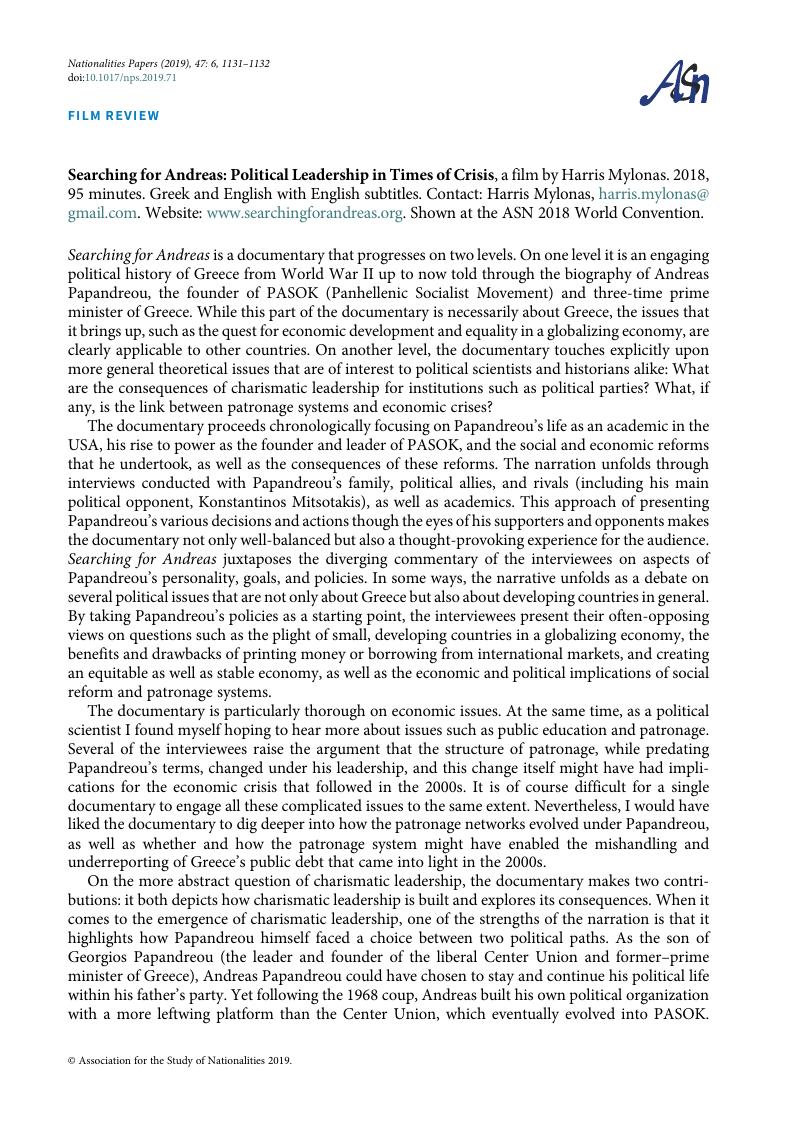Searching for Andreas is a documentary that progresses on two levels. On one level it is an engaging political history of Greece from World War II up to now told through the biography of Andreas Papandreou, the founder of PASOK (Panhellenic Socialist Movement) and three-time prime minister of Greece. While this part of the documentary is necessarily about Greece, the issues that it brings up, such as the quest for economic development and equality in a globalizing economy, are clearly applicable to other countries. On another level, the documentary touches explicitly upon more general theoretical issues that are of interest to political scientists and historians alike: What are the consequences of charismatic leadership for institutions such as political parties? What, if any, is the link between patronage systems and economic crises?
The documentary proceeds chronologically focusing on Papandreou’s life as an academic in the USA, his rise to power as the founder and leader of PASOK, and the social and economic reforms that he undertook, as well as the consequences of these reforms. The narration unfolds through interviews conducted with Papandreou’s family, political allies, and rivals (including his main political opponent, Konstantinos Mitsotakis), as well as academics. This approach of presenting Papandreou’s various decisions and actions though the eyes of his supporters and opponents makes the documentary not only well-balanced but also a thought-provoking experience for the audience. Searching for Andreas juxtaposes the diverging commentary of the interviewees on aspects of Papandreou’s personality, goals, and policies. In some ways, the narrative unfolds as a debate on several political issues that are not only about Greece but also about developing countries in general. By taking Papandreou’s policies as a starting point, the interviewees present their often-opposing views on questions such as the plight of small, developing countries in a globalizing economy, the benefits and drawbacks of printing money or borrowing from international markets, and creating an equitable as well as stable economy, as well as the economic and political implications of social reform and patronage systems.
The documentary is particularly thorough on economic issues. At the same time, as a political scientist I found myself hoping to hear more about issues such as public education and patronage. Several of the interviewees raise the argument that the structure of patronage, while predating Papandreou’s terms, changed under his leadership, and this change itself might have had implications for the economic crisis that followed in the 2000s. It is of course difficult for a single documentary to engage all these complicated issues to the same extent. Nevertheless, I would have liked the documentary to dig deeper into how the patronage networks evolved under Papandreou, as well as whether and how the patronage system might have enabled the mishandling and underreporting of Greece’s public debt that came into light in the 2000s.
On the more abstract question of charismatic leadership, the documentary makes two contributions: it both depicts how charismatic leadership is built and explores its consequences. When it comes to the emergence of charismatic leadership, one of the strengths of the narration is that it highlights how Papandreou himself faced a choice between two political paths. As the son of Georgios Papandreou (the leader and founder of the liberal Center Union and former–prime minister of Greece), Andreas Papandreou could have chosen to stay and continue his political life within his father’s party. Yet following the 1968 coup, Andreas built his own political organization with a more leftwing platform than the Center Union, which eventually evolved into PASOK. This choice to establish a new political organization is a noteworthy one given the path of least resistance that was available to Andreas and suggests that, beyond charisma, what makes a successful and resilient political leader is organizational skill and some level of ideological commitment. Therefore, the founding of PASOK and the path to its early electoral success are other issues that I would have liked to learn more about in the documentary. For example, it would have been interesting to hear from the individuals who were involved in the grassroots or lower echelons of the party organization as well as ordinary voters who supported PASOK.
The second and main point that the movie makes about charismatic leadership is that the death of a charismatic leader constitutes a unique challenge for the political parties that survive him. This part of the documentary, which depicts PASOK’s “crisis of legitimacy,” is both convincing and potentially applicable to political parties in other countries such as the Motherland Party of Turkey, which was politically dominant during the 1980s but did not long survive the death of its arguably charismatic leader, Turgut Özal.
Finally, watching the biographical documentary of an ambitious political leader, it is difficult not to compare and contrast him with other ambitious leaders of countries such as Hungary, Poland, and Turkey today. While some of the interviewees depict Papandreou as a populist rather than a socialist, with the exception of one or two sentences from Mitsotakis, the documentary does not portray a politician who undermines the democratic system and entrenches his power by restraining judicial independence and freedom of speech. This portrayal differentiates Papandreou from the leaders of the above-mentioned countries. The remaining question is whether that is because he was never politically hegemonic enough to undermine the system in this way or because he inherently respected democratic principles.



